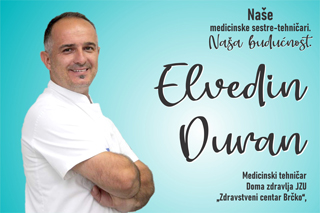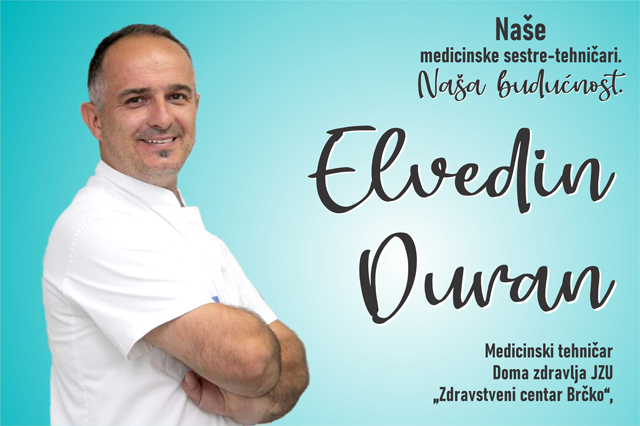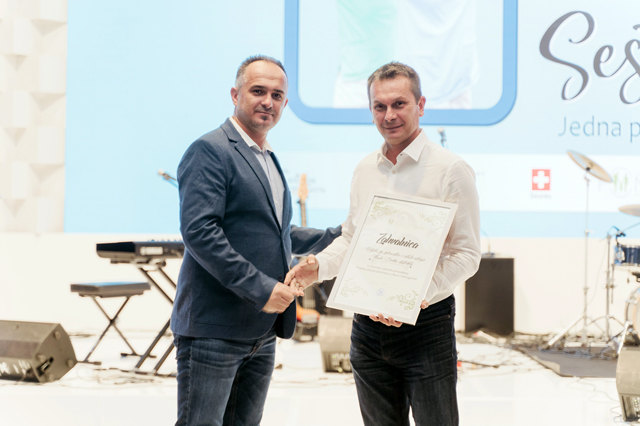
Elvedin Duran is Head Nurse of the Primary Health Care Center “Healthcare Center Brcko” in Brcko District of Bosnia and Herzegovina. He was born in 1981 in Livno. He completed nursing high school in Livno and the nursing faculty in Sarajevo in 2005.
How old were you when you started working? Why did you choose this profession? At the age of 28, I started working at the
Public Healthcare Center "Health Center Brcko", Primary Health Care Center Brcko as a community nurse. So, my beginnings are closely related to the trainings that we undergo with the support of Fami Foundation. Humanity and fondness for this profession from early childhood are the reasons why I chose this profession as my vocation.
What is it like to be a nurse in Bosnia and Herzegovina? Humane but also challenging. Helping a patient, restoring a smile and satisfaction on his face, bringing back a glimmer of hope in life and at the same time feeling satisfied and useful is something that makes this profession beautiful, humane and honorable. However, various barriers such as the lack of adequate support - personnel, equipment and finances are the challenges we deal with, but I emphasize again that humanity and love for work drive us to give our best.
What are the shortcomings in the Institution you work at? What would you change? The Health Center Brcko consists of two organizational units, namely primary health care – Primary Health Care Center, and secondary health care - Hospital. Several institutions are involved in the provision of health care in Brcko District of Bosnia and Herzegovina, from our Health Center, the Government of the Brcko District of Bosnia and Herzegovina - the Department of Health and Other Services, the Health Insurance Fund, and the Assembly of the Brcko District of Bosnia and Herzegovina. The lack of IT program and informatization (connection) is certainly the biggest problem at the moment in Health Care Brcko. We all are looking forward to modernization in that segment and optimistically await the improvement of that deficiency. Informatization enables primary health care nurses to plan and spend more time with patients, both in the premises of the Health Center and in home visits. Community nurses training is conducted through a project implemented by Fami Foundation, with the support of the Embassy of Switzerland in BiH, but due to the mentioned problem of the lack of IT solutions, nurses from Primary Health Care spend most of their working time filling out referrals and prescriptions for patients, which is devastating in the current times.
How do you see the position of nurses in Bosnia and Herzegovina? Difficult in some segments, as it can be noted that the development of nursing is not taking the direction that this profession deserves. It is necessary for the "system" to recognize nursing as the most important part of healthcare, and to provide it with all the prerequisites for further development and progress, which in the end brings satisfaction to nurses as well as patients. Investing in further education and training of nurses is extremely important for all citizens of Bosnia and Herzegovina. I also would like to compliment our local community because, in addition to the entity, it also decided to provide the opportunity for health professionals to take the professional exam in Brcko, i.e. the relevant Department of Health and Other Services.
How important are nurse-patient and nurse-doctor relationships? Both relationships are very important, because developing mutual trust in the patient-nurse relationship facilitates work, and certainly makes it more productive and of better quality. The nurse-doctor relationship is extremely important and I will just mention that the nurse and the doctor are the closest coworkers and need to act as a team. The importance of the relationship is clearly shown by the adopted Mid-Term Health Development Plan of Brcko District BiH 2020-2024, underlining the relationship and the development of family medicine, which is the basis of primary health care, and certainly the continuous monitoring of the needs of the network of outpatient clinics, through our organization in the area of the entire Brcko District BiH.
How to prevent nurses’ outflow from Bosnia and Herzegovina? Migrations - departures of high-quality, experienced, educated nurses indicate that colleagues are not satisfied, and that is why they are leaving Bosnia and Herzegovina. It is necessary that we all make maximum efforts together to provide nurses with the best possible working conditions because the end product of these better working conditions is a SATISFIED PATIENT and a better living environment for everyone. When it comes to migration, departures are most often mentioned. I believe that it would be good and desirable to provide quality come-and-work in Brcko District of Bosnia and Herzegovina programs.
What are the most frequent problems nurses in Bosnia and Herzegovina encounter? The biggest problem is the lack of adequate support. I am primarily referring to human resources. Due to the shortage of employees, some colleagues are doing work of several people. Also, there are insufficient number of quality trainings, and insufficient promotion of nursing as the most important branch of the health sector.
Work and conditions during the coronavirus pandemic? A very difficult and challenging period in Brcko District of BiH. However, I believe that a great deal of gratitude should be expressed to all health professionals for definitely giving their best. We need to be open, aware that we have faced something that none of us had had the chance to experience before. Nevertheless, our efforts clearly showed that at least we in Brcko District of Bosnia and Herzegovina followed the recommendations of the WHO, Crisis Group HQ, Public Health and other expert teams. We quickly established triage, covid testing, patient transport, records, expanded accommodation capacities, provided adequate shelter for waiting in the winter conditions, complete free diagnostics and the like.
How important are additional trainings for healthcare providers in Bosnia and Herzegovina? I think that our conversation is too short to explain the importance of continuing development. I must point out that we strive to have both internal and external continuing education. We are aware that we have to educate the citizens and in cooperation with other associations. Only high quality and continuing education give us the right position in society.
How important is the Fami Foundation for the health professions in Bosnia and Herzegovina? The name of Fami Foundation evokes a feeling of satisfaction and happiness in me, because they truly justified the goal of the project, which is to contribute to improving health outcomes in BiH and improving the quality and efficiency of the nursing services. Trainings, equipment donations, standard operating procedures, cooperation with ministries and universities are an important step in the improvement of nursing.
A moment from your career that you will always remember... The beginning of the Corona virus pandemic, entering the fight with the unknown, deserted and empty city streets, only health workers going to work, moments when you only think about the patient and prove your love for this humane call, not thinking of consequences for yourself and your family. The period that showed us how one virus "stops the world" and how important investments in the health system are.
Your message to young generations planning to choose a health profession... If you do what you really love, you will be happy throughout your working life, and being happy and satisfied with vocation you chose makes your life better and more fulfilling.



